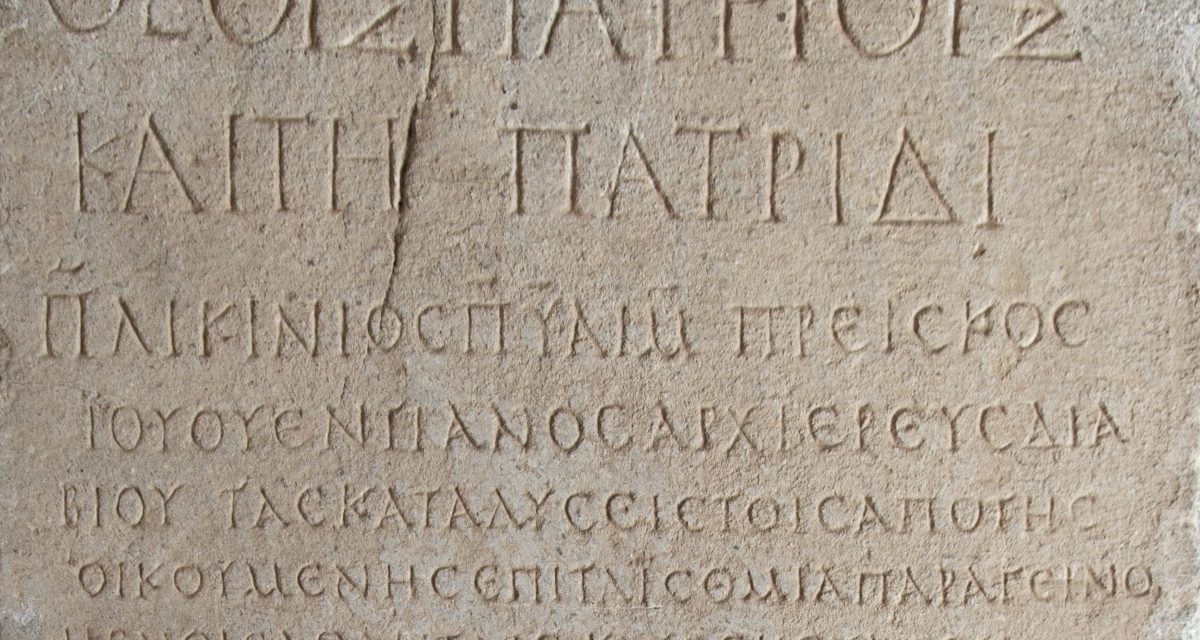Arguably most people realize that words such as democracy, philosophy or tragedy come from Greek, since the very concepts which they represent also have their roots in Greece. And you might also suspect the Greek origins behind some strange and obscure words like “anathema”, “synecdoche” or “onomatopoeia”, as well as long and hard-to-pronounce medical or scientific terms terms such as otorhinolaryngology or trichotillomania.
Yet it might surprise you to find out that a number of words used in everyday conversation –from “church” and “angel” to “problem” or “plastic“– are actually Greek!
Below we will list some of these words and provide their etymology: many among them –perhaps the majority– have come to English through Latin, some have come through French and others directly through Ancient Greek. Finally, many have been coined by English (or other non-Greek) speakers using Greek words to label new concepts and name new objects.
Religion, spirituality and the supernatural
Religious faith is arguably a field where one can encounter many more Greek words than you might expect, considering that none of the most widely practiced (from prasso “to do”) religions hails from Greece; however, the country was actually one of the first places where Christianity was spread –displacing the native polytheism (polys “many” + theos “god”)– especially by Paul the apostle (apostolos “emissary” from apostello “to send off”).
In fact, it is believed that the first European convert to the then-new monotheistic (monos “one, single” + theos) religion was Lydia from the city of Philippi in Macedonia, who was baptized (vaptizo “to dip in liquid”) around 49-50 A.D. Paul spent much time in Greece and Greek-speaking areas, and it was in Greek that he wrote all of his famous epistles (epistoles, from epistello “to send a message” ) – that is, formal didactic (didaktikos, from didasko “to teach, educate”) letters.
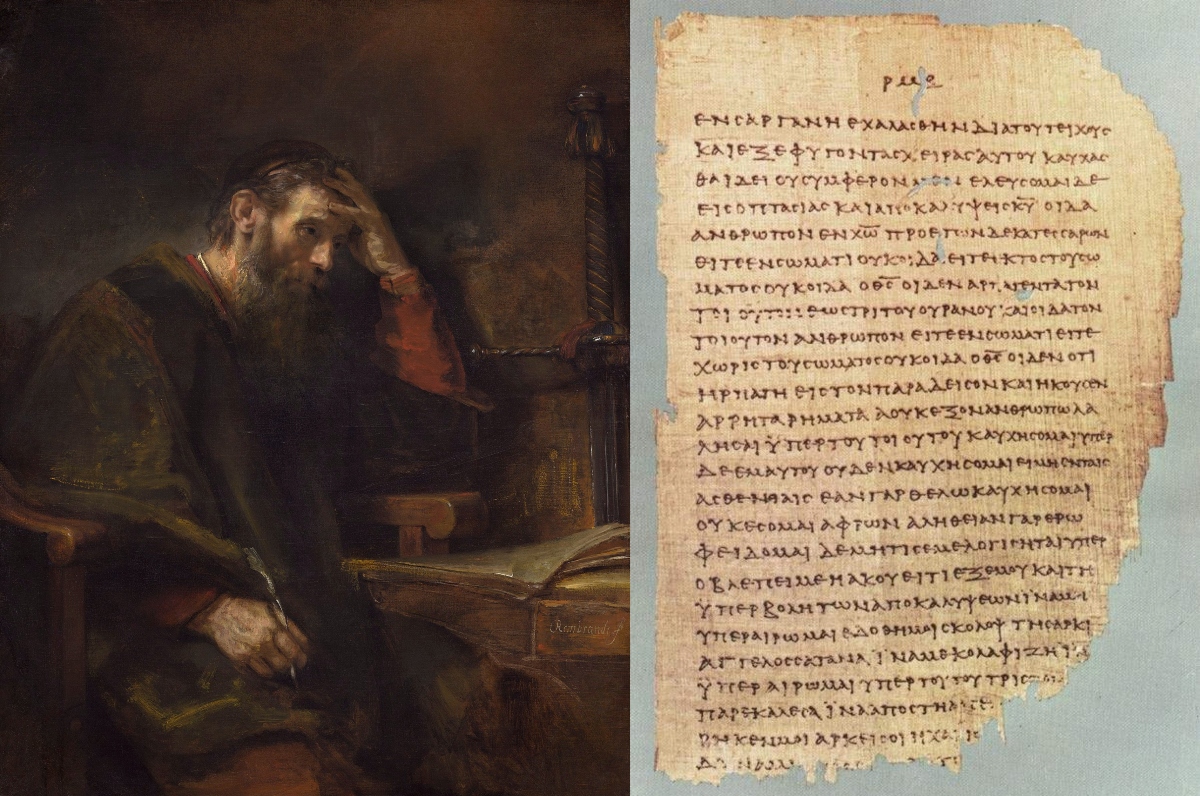 Left: Saint Paul, c. 1657, Rembrandt; right: A folio from Papyrus 46 (an early Greek New Testament manuscript) containing 11:33–12:9 from the Second Pauline Epistle to the Corinthians
Left: Saint Paul, c. 1657, Rembrandt; right: A folio from Papyrus 46 (an early Greek New Testament manuscript) containing 11:33–12:9 from the Second Pauline Epistle to the Corinthians
The religion itself took its name from Christ (Christos), the Greek equivalent of the Hebrew “messiah”, meaning “[the] anointed [one]”, as Greek was extremely widespread at the time, and the New Testament was written in Greek by the evangelists (evangelistés “bringer of good news”). Centuries earlier, the Old Testament had been translated into Greek (before any other language); the two together comprise the Bible (from vivlion “book” from vyvlos “papyrus, scroll”), Christianity’s holy book, the final part of which is John’s Apocalypse (apokalypsis “revelation”, literally “uncovering”).
Note that the English word for a place of worship in Judaism (from Ioudaios, the Greek rendering of the Hebrew word Yehudi – where the word Jewish also derives from), the religion of the Hebrew (from Hevraios, the Greek rendering of the Aramaic ʿiḇray) people, is synagogue (synagogé) from syn “with, together” + ago “to lead”, due to Greek being widely spoken in the Hellenistic period in Palestine (Palaistine) – a word of uncertain origin, first used by ancient historian Herodotus and then by other Greek authors; possibly a cognate of the word Philistine.
Church derives from kyriaké [oikía], meaning “[house] of the Lord”, froms kyrios “lord”; note that Kyriaké is the Greek word for Sunday, in equivalence of the Latin Domenica, while the Greek word for church is ekklesía “assembly”, where ecclesiastic comes from. Priest derives from presvyteros, a comparative of presvys “elder”, while cleric and clergy derive from klerikos “of the clergy”, from kleros “lot, allotment; heritage”; layman on the other hand comes from laïkos “laic, secular”, from laos “crowd, people”.
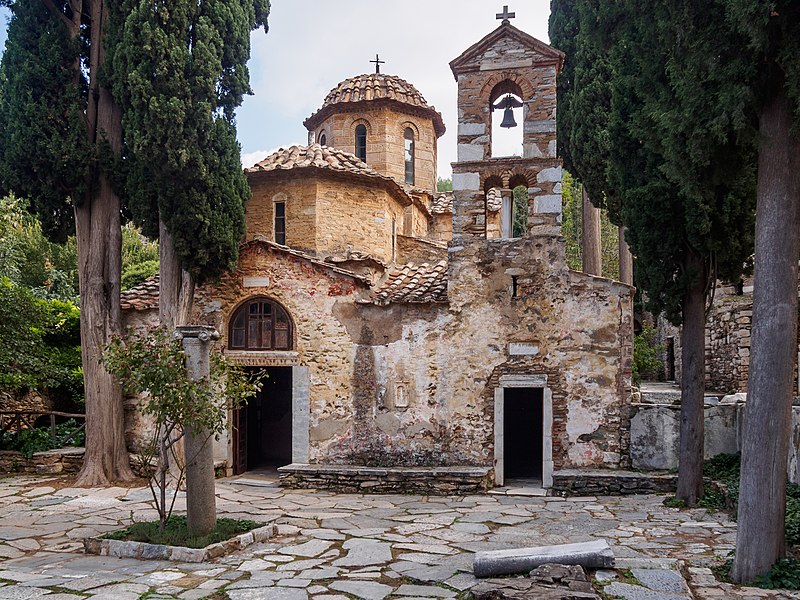 The katholikon (major church building) of the Monastery of Kaisariani (by C messier via Wikimedia Commons)
The katholikon (major church building) of the Monastery of Kaisariani (by C messier via Wikimedia Commons)
Cathedral comes from kathedra (kata “down” + hedra “seat” – where chair also comes from), liturgy and liturgical from leitourgía “holy mass; public service” (from laos “people” + ergon “work”), eucharist (eucharistía “gratitude”) from eu “well” + charis “grace”), hieratic (hieratikos) from hiereus “priest” (from hieros “sacred”), canonical from kanon “standard, canon“, bishop from episkopos “overseer”, diocese from dioikesis “administration”, deacon from diakonos “servant, minister” and psalm from psalmos “sound from musical strings; (later) sacred song”.
Epiphany comes from epiphaneia “manifestation” and prophet (prophetes, “interpreter of a god’s will, seer”) from pro “before” + phemí “to say”. Martyr (martys) literally means “witness”. Monk derives (through the Latin monachus) from monachos “solitary; (later) friar”, from monos “single, alone”, where monastery and monastic also come from. Hermit (but also eremite) derives from eremites, from eremos “solitary; desert”, and anchorite (anachorités) from anachoreo “to withdraw”; cenobite comes from koinovion “community life; convent” from koinos “common” + vios “life”, while ascetic derives from asketés “someone who trains laboriously; (later) hermit”, from asko “to exercise”, to denote the laborious efforts of self-denial.
Tomb comes from tymvos “mound; tomb”, while catacomb comes –through the Latin catacumba– from kata “under” + tymvos; cemetery (koimeterion), on the other hand, literally means “sleeping place”, from koimaomai “to sleep”, and necropolis “city of the dead” (nekros “dead” + polis).
 Sleeping Female Figure (1877) by Yannoulis Chalepas, at the Tomb of Sofia Afentaki, First Cemetery of Athens (by LBM1948 via Wikimedia Commons)
Sleeping Female Figure (1877) by Yannoulis Chalepas, at the Tomb of Sofia Afentaki, First Cemetery of Athens (by LBM1948 via Wikimedia Commons)
The Christian church was originally united, until various theological (theology comes from theología “the study of God”) disputes lead to a series of schisms (from schisma “division”, from schizo “to split”) and to the establishment of several dogmas (literally “opinion, tenet”, from dokeo “to think, suppose”), such as the Western Catholic (from katholikos “universal”, from kata “down; about” + holos “whole”) Church and the Eastern Orthodox (orthodoxos, from orthos “straight, true, correct” + doxa “belief”) Church. The first is headed by the Pope, who derives his name from papas, a Greek title for priests and bishops (still the most common way to refer to priests in Modern Greek), literally meaning “papa, daddy” in Ancient Greek; the Orthodox chucrh, on the other hand, comprises several autocephalous (from auto “self” + kephalé “head”) churches, although many consider the Ecumenical (oikoumenikos “of the whole world”) Patriarch (patriarches, from patér “father” + archo “to rule”) as a leading figure.
Numerous denominations have since appeared, from Presbyterianism (from the aforementioned presvyteros) and the Baptist Church to Methodism (from method [methodos]) and Pentecostalism (from Pentecost [Pentecosté] literally “fiftieth [day]”, the descent of the Holy Spirit upon the Apostles fifty days after the resurrection of Jesus). Sometimes, followers of different persuasions disagree over the scripture’s most authentic (authentikos “genuine” from authentes “acting on one’s own authority; master”) interpretation, accusing each other of apostasy (apostasía “defection”, from apo “off, away” + histemi “stand”) or heresy (hairesis literally “doctrine”, from hairo “to take, choose”).
As for atheists (from a– “no, un-” + theos “god”) or agnostics (from a– + gnosis “knowledge”), they may even be blamed for blasphemy (both words deriving from blasphemeo “to slander, speak profanely, blaspheme“, from a root meaning “evil” or “to hurt” + phemi “to say”) if they live in a theocracy (from theos + kratos “power; state”).
 On to more ethereal (aitherios, from aithér “upper air of the atmosphere; heaven” where ether also comes from) concepts: Paradise (paradeisos) is a Greek word of Proto-Iranian origin, while angel (aggelos, of uncertain origin) meant “messenger”, and halo from comes from halos “disk of the sun or moon; ring of light around the sun or moon”. As for demon (daimon), it used to signify a deity or protective spirit. Devil, on the other hand, ultimately derives from the Latin diabolus, which from Greek diavolos “accuser, slanderer” (from diavallo “to slander”, literally “to throw across” from dia “through, across” + vallo “to throw”). The diabolical shape of the pentagram takes its name from pente “five” + gramma “letter”, while exorcise (exorkizo) means “to bind by oath” from horkos “oath”.
On to more ethereal (aitherios, from aithér “upper air of the atmosphere; heaven” where ether also comes from) concepts: Paradise (paradeisos) is a Greek word of Proto-Iranian origin, while angel (aggelos, of uncertain origin) meant “messenger”, and halo from comes from halos “disk of the sun or moon; ring of light around the sun or moon”. As for demon (daimon), it used to signify a deity or protective spirit. Devil, on the other hand, ultimately derives from the Latin diabolus, which from Greek diavolos “accuser, slanderer” (from diavallo “to slander”, literally “to throw across” from dia “through, across” + vallo “to throw”). The diabolical shape of the pentagram takes its name from pente “five” + gramma “letter”, while exorcise (exorkizo) means “to bind by oath” from horkos “oath”.
We also encounter Greek words in the fields of ontological (from on [gen. ontos] “being, entity”]), eschatological (from eschatos “final”) and generally metaphysical (from meta “after, beyond” + physis “nature”) explorations in the quest for the meaning of life and the existence of cosmic (from cosmos “world”) powers. Mysticism and mystic (mystikos) derives from mystes “an initiate” from myo “to close one’s lips or eyes; initiate into the mysteries”, while magic comes from magos (of an indeterminate Old Iranian origin) meaning “magician, sorcerer”, and necromancy (necromanteía) from nekros “dead” + manteía “divination”.
Astrology (astrología) comes from astron “star”, while the zodiac circle takes its name from zodion, a diminutive of zóon “animal”, and horoscope from hora “any limited time” (where hour comes from) + skopos “watcher”. Finally, phantom derives from phantasma “apparition, specter, phantasm” (from the verb phantazo“to make visible”), and ectoplasm from ektos “outside” + plasma “something formed” (where plasma also comes from). Finally, psychic derives from psyché “soul” while telepathy and telekinesis come from the combination of tele “far off” with pathos “emotion, condition” and kinesis “motion”, respectively.
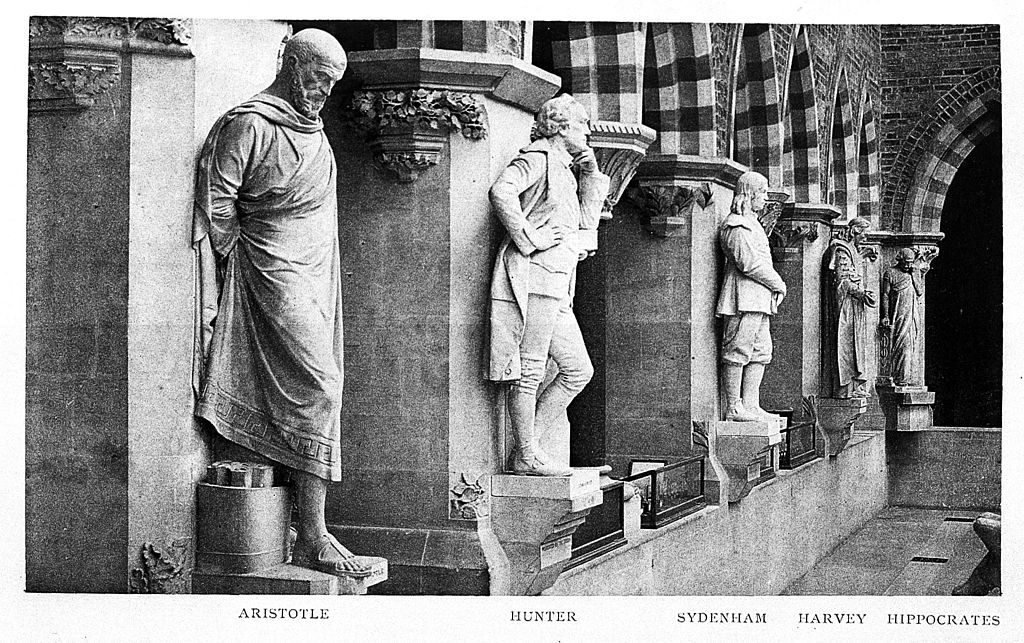 Statues of Aristotle and Hippocrates in the Oxford Museum Wellcome Collection (via Wikimedia Commons)
Statues of Aristotle and Hippocrates in the Oxford Museum Wellcome Collection (via Wikimedia Commons)
Science, engineering and technology
Several words related to science trace their origins directly to Greek, partly because some of the world’s oldest known mathematicians, scientists and inventors came from Greece and the Greek world: from Thales, Pythagoras, Aristotle and Democritus (who combined philosophy with mathematical thinking and the nascent natural sciences [astronomy, biology, physics]) to Euclid, the “father of geometry“, and Archimedes, one of the most important scientists, engineers and inventors in antiquity (see Part 1 and Part 2 for the etymologies of these words).
It is from those times that we have inherited not only words like mathematics (coined by Pythagoras) or physics (coined by Aristotle), but also phenomenon (“that which is apparent”, from the middle voice of phaino “to show”), hypothesis (“supposition”, from hypo “under” + tithemi “to put”), theory (theoría) and theorem (theorema, from theoro “to look at, consider, speculate”, from thea “view” + horo “to see”), method (methodos, from meta “after” + hodos “way”) and axiom (axioma “a requisite, a self-evident principle”, from axióo “to consider worthy, to demand”, from axios “fit, worthy”).
 From the statue of Archimedes in Syracuse, Italy (by Davide Mauro via Wikimedia Commons)
From the statue of Archimedes in Syracuse, Italy (by Davide Mauro via Wikimedia Commons)
Archimedes was responsible of a number of mathematical achievements, such as an approximation of pi, and for discovering the law of buoyancy (“Archimedes’ principle”), but was equally adept at the practical (from prasso “to act”) application of his theories, designing innovative machines (from Latin machina, from Greek mechané – where mechanic also comes from), such as a screw pump and compound pulleys. Legend has it that, when he figured out the solution to a problem (provlema “hindrance”, from pro “in front of” + vallo “to cast”) while stepping in a bath, he sprang up and ran through the streets naked exclaiming Heureka! (“I found [it]!”); this anecdote (anekdoton, literally “unpublished”) is the origin of the expression “Eureka“, and also of the term heuristic.
In many cases, scientific terms were coined by non-Greeks relatively recently, using prefixes and suffixes in Ancient Greek to form a word for something newly-invented or, at least, newly-discovered. For example, in paleontology (itself deriving from the combination of the adjective palaios “old, of old” + the suffix “-logy“) the word “dinosaur” was coined by Sir Richard Owen in 1841, by combining the adjective deinos “great, terrible” and sauros (variant of saura), “lizard”. Other fields deriving their names from Greek include biology (from vios “life”), botany (from votanon “herb”), geology (from ge “earth”) and ecology (from oikos “house”).
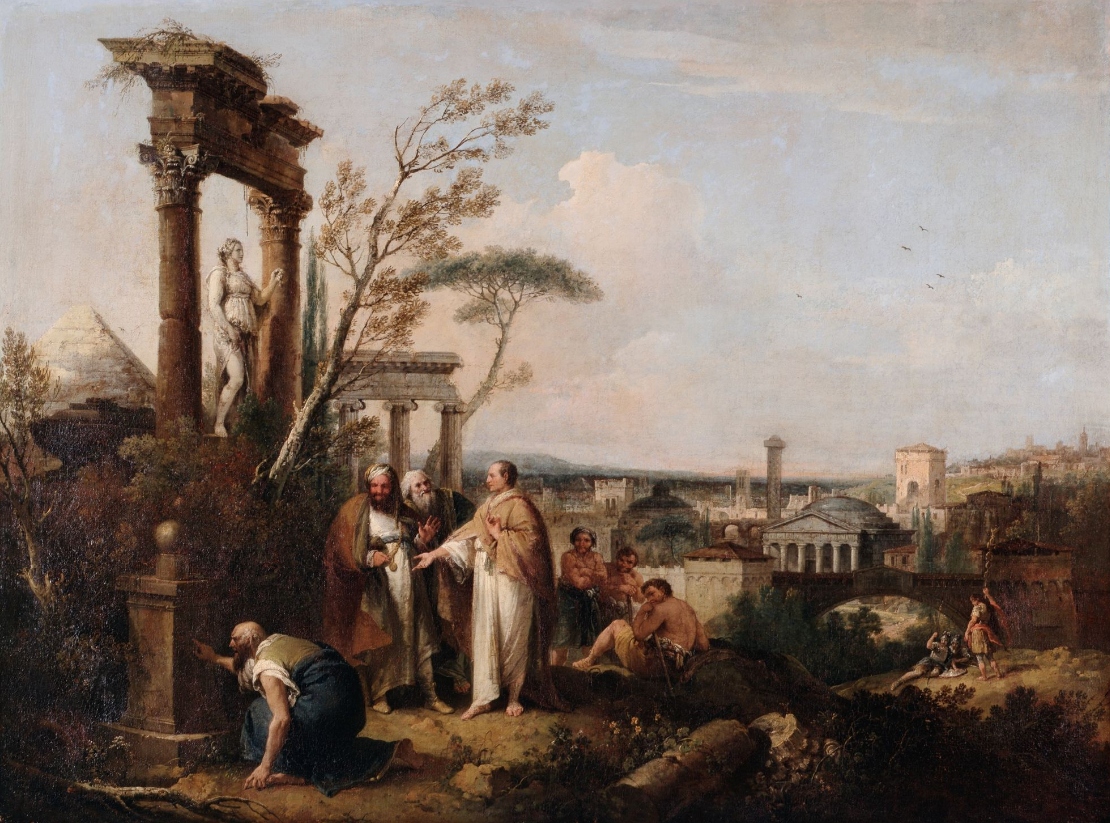 Cicero discovers the tomb of Archimedes, 1747, Francesco Zuccarelli
Cicero discovers the tomb of Archimedes, 1747, Francesco Zuccarelli
Similarly, few of the inventions made or perfected by ancient Greeks carry names of Greek origin – one such example is the siphon (“tube, pipe”). And yet, the terms technical and technology derive from techne “craft, an art that requires a skill”. The names of various inventions were composed in a similar way: from substances and compounds (such as glycerin, from glykys “sweet” and dynamite from dynamis “strength”), to devices (such as the polygraph, from polys “much” + grapho “to write, draw”)
Plastic means “moldable, something with plasticity” from plasso “to mold, form” – which is why, apart from the famous polymer (polys “much, many” + meros “part”) material, we use this word in “plastic surgery” and the “plastic arts”. Camera comes from kamara “vault, vaulted structure” (also the root of “chamber“), while photograph comes from phos (genitive photos) “light” + grapho. Automatic comes from automatos “acting of one’s own will, spontaneous”, and android comes from aner (genitive andros) “man” + eidos “form, appearance”, while cybernetic comes from the adjective kyvernetikos, from kyvernetes “steersman, pilot“, from kyverno “to steer, to direct” (where the word “govern” also comes from) – note that cyborg is a portmanteau of cybernetic and organism (in its turn deriving from organon “tool, instrument; organ“).
Pilot itself ultimately derives from pedotes “helmsman” from pedon “oar”; helicopter was coined in 1861 by Gustave Ponton d’Amécourt, from the words helix “spiral” + pteron “wing”, while aerodynamics combines aér “air” with dynamics (from dynamis “strenght”). Digital has a Latin root, but analog comes from analogos “corresponding, proportionate”, from ana “up to” + logos, meaning, in this context, “ratio”. The name klaxon was coined from the ancient verb klazo “to shriek, make a sharp sound”. An invention prototype takes its name from prototypos “original, primitive”, from protos “first” + typos “impression, pattern, type“.
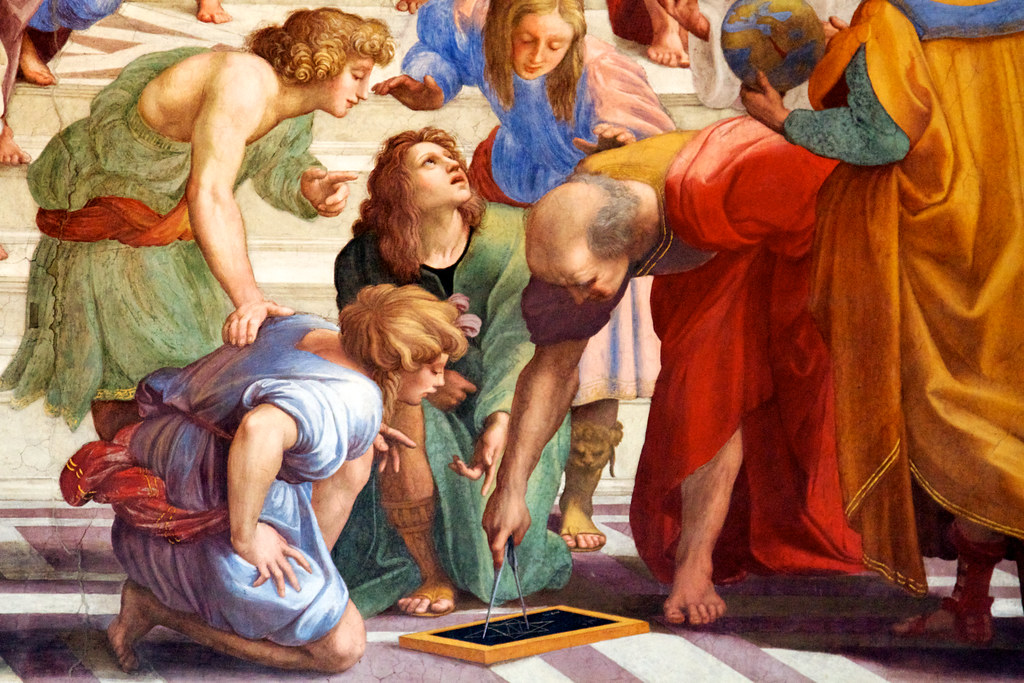 The School of Athens (detail: Bramante as Euclid), 1509-1511, Raphael (by Nick Thompson via flickr)
The School of Athens (detail: Bramante as Euclid), 1509-1511, Raphael (by Nick Thompson via flickr)
Miscellaneous
For the final part of this series, we present a miscellaneous archive (from archeion “public building; archive”, from archo “to rule”) featuring some “orphan” (from orphanos) words which we could not group into any larger category (kategoría “accusation, predication” from kategoreo “to accuse”, from kata “against” + agoreuo “to speak publicly”), and which we can encounter sporadically (from sporadikos, from sporos “seed, sowing [of seed]”) in English.
We have already mentioned grammar (see Part 2) – the, apparently unrelated, word glamor is in fact believed to be an alteration of “grammar”, in a specialized use of that word’s medieval sense of “any sort of scholarship, especially occult learning”. Speaking of glamor: Autograph means “a writing in one’s own hand”, from auto “self” + grapho “to write”, while emblem (and emblematic) comes from emvlema “insertion, embossed ornament, graft“, from en “in” + vallo “to cast, put”.
As for the word graft itself, it is yet another derivative of the word grapho, through the Latin graphium “stylus”, so named from the resemblance of a scion or shoot to a pointed pencil. (Note that the spelling of the word “stylus” [where “style” also derives from] is influenced by the spelling of Greek stylos “pillar” [where peristyle comes from]. However, the original Latin word stilus “stake, stylus” is not believed to come from Greek.)
On that same note: the adjective logistic (encountered in terms such as “logistic growth”) comes from logistikos “practiced in arithmetic (from arithmos “number”); rational”, itself from logos “reason, computation” (where logic and the suffix –logy also come from). However, the (arguably more well-known) term “logistics” probably does not share that same root, instead coming from the French logis (“lodging”, in fact a cognate of the word “lodge”).
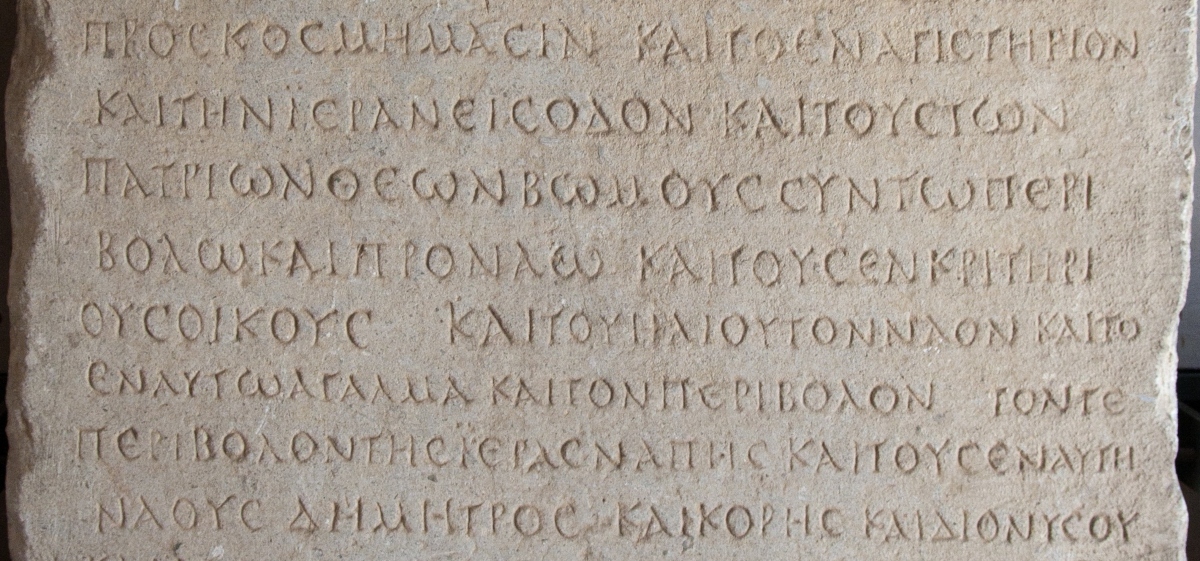 Another interesting case is amalgam – a true linguistic amalgam, originating from the Greek malagma “emollient; malleable material” from malasso “to soften”, assimilated into Arabic as al-malḡam “emollient poultice or unguent for sores”, and then passing to English through the Latin amalgama “mercury alloy”.
Another interesting case is amalgam – a true linguistic amalgam, originating from the Greek malagma “emollient; malleable material” from malasso “to soften”, assimilated into Arabic as al-malḡam “emollient poultice or unguent for sores”, and then passing to English through the Latin amalgama “mercury alloy”.
Next in our small panorama (from pan “all” + horama “view”) of words: Abyss and abysmal come from avyssos “bottomless” from the privative prefix a– + vythos/vyssos “depth, sea bed”; ballistic comes from vallistra “crossbow” from vallo “to cast, throw”; ecstasy (ekstasis “displacement; trance”) derives from ek “out” + histemi “to stand”; monotone and monotonous come from monotonos “of one tone”, from monos “single” + tonos “tone” (see Part 2); plasmatic comes from plasma “something formed”, from plasso “to form, mold”; septic (as in “septic tank”) comes from septikos “characterized by putridity”, from sepo “to rot”; and symposium literally means “banquet, drinking party” from syn “together” + pino “to drink”.
We also can’t omit the numerous fantastic (phantastikos“imaginary”) creatures that have Greek names, having come from Greek mythology. Among them we find the words dragon (drakon, probably from derkomai “to see, watch”), siren (seirén), nymph (nymphe), phoenix (phoinix, probably of Egyptian origin) and pegasus (pegasos). It is also worth mentioning the words cyclops (from the monster of the same name), centaur (kentauros, probably from kenteo “to sting, goad” + tauros “bull”), griffin (from gryps), gorgon (after the monster Gorgo, from gorgos “terrible”) and hydra (from the eponymous monster, from hydros “water snake”, from hydor “water”). Another mythical figure, the goddess of retribution, Nemesis (“distribution; retribution”, from nemo “to distribute”), has lent her name to the concept of someones’ chief enemy.
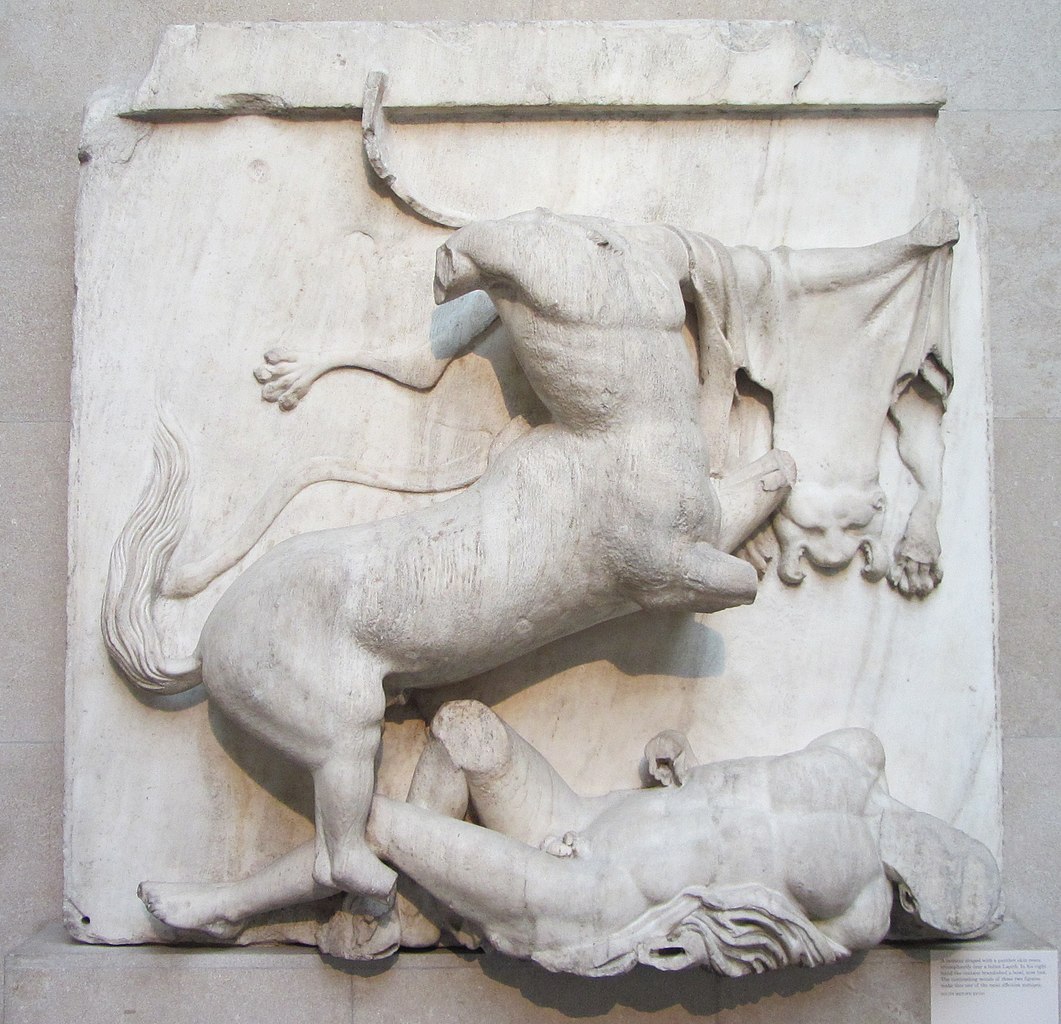 Parthenon sculpture depicting a centaur and a Lapith, British Museum (by BabelStone via Wikimedia Commons)
Parthenon sculpture depicting a centaur and a Lapith, British Museum (by BabelStone via Wikimedia Commons)
Paradox comes from paradoxos “unexpected, strange”, from para “beyond” + doxa “expectation, belief”, while oxymoron is a compound of moros “foolish” + oxys “sharp, keen”. (Note that the, now obsolete, term “moron” was coined in 1910 by psychologist Henry H. Goddard, based on moros; sophomore is also believed to derive from the combination of moros with sophos “wise”. On the other hand, idiot comes from idiotes, literally “a private citizen”, [from idios “one’s own, private”], which later took the sense of a commoner [plebeian], hence uneducated and ignorant).
The words barbarian, barbaric and barbarous all derive from varvaros “foreign, non-Greek-speaking”; the word is a characteristic example of onomatopoeic construction (from onoma “name” + poieo “to make, to do”), alluding to the incomprehensible sounds of foreign languages, perceived as “bar-bar”. Note that, although the word sounds somewhat derisive and definitely ethnocentric (from ethnos “nation” + kentron “rivet, center“), it did not originally have the same xenophobic (from xenos “foreign, strange” + phovos “fear”) sense that it has since acquired. We should also mention that nomad comes from nomas “someone roaming about for pasture” (from nomos “pasture, fied”), used to describe pastoral tribes.
Finally, as many might already know, lesbian simply means “person from Lesbos”, the Greek island mostly famous as the birthplace of Sappho (where the more old-fashioned “sapphic” also derives from). The great lyric (from lyrikos, meaning “of the lyre“) poet, regarded by some as “the Tenth Muse”, is known for her works where she expressed a passionate love for other women. Although there are still those who interpret the bonds described as platonic (named after the famous philosopher Plato) friendships, it is today widely accepted that her poetry portrays homoerotic (from homos “same” + eros “romantic love, desire”) feelings. Note that “hetero” (the first part of heterosexual) means “other, different”.
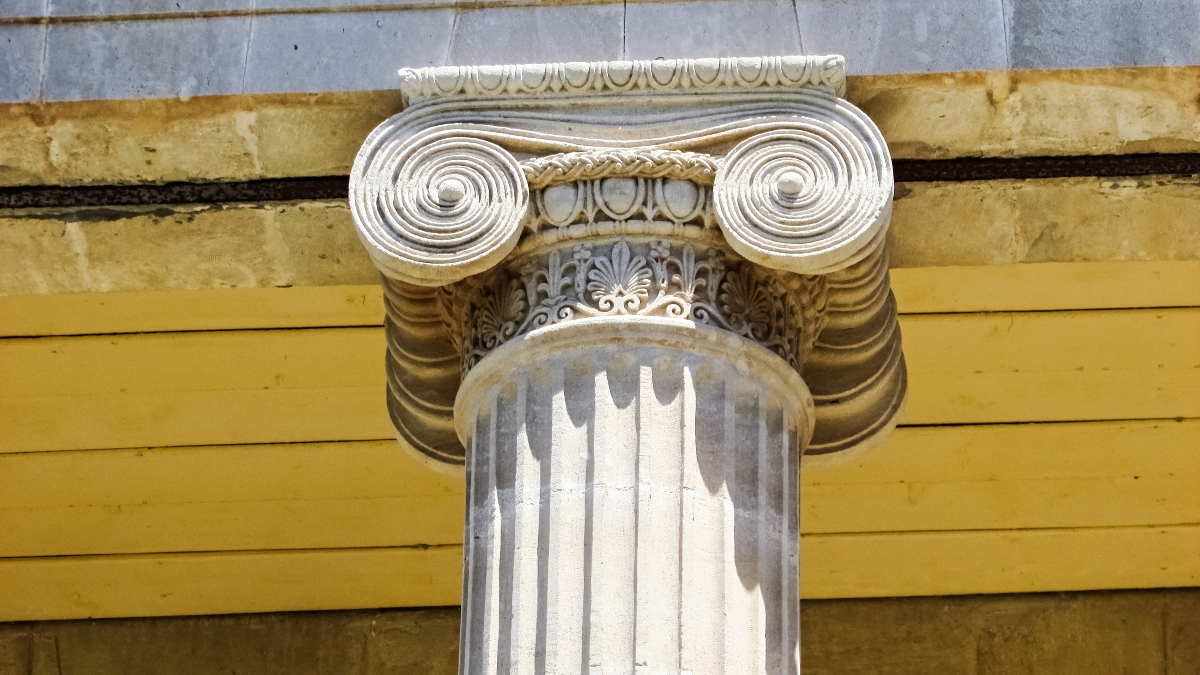 You are perhaps wondering why we have not yet included a list of medical terms stemming from Greek – as a vast field, where Greek terms are almost omnipresent, Health, Medicine and Anatomy, along with the related field of Psychology, deserve a segment of their own: Greek words about health and medicine in English.
You are perhaps wondering why we have not yet included a list of medical terms stemming from Greek – as a vast field, where Greek terms are almost omnipresent, Health, Medicine and Anatomy, along with the related field of Psychology, deserve a segment of their own: Greek words about health and medicine in English.
In “Common words you (probably) didn’t know were Greek – Part 1“: words about human character, animals, biology, geography and planets
In “Part 2“: words from the fields of music and theater, speech and writing, and education and sports
In “Part 3“: words from the fields of time and space, everyday objects, politics, but also crisis and war
Read also via Greek News Agenda: Beyond Socrates – Greek philosophers you might not know; Lesbos – An island of culture and history; USA city names of Greek origin – Part 1; USA city names of Greek origin – Part 2
N.M.

